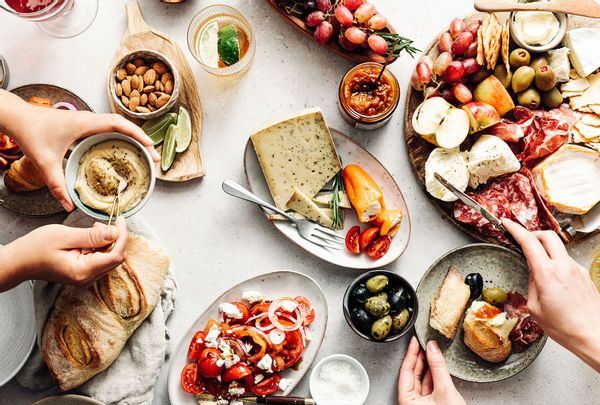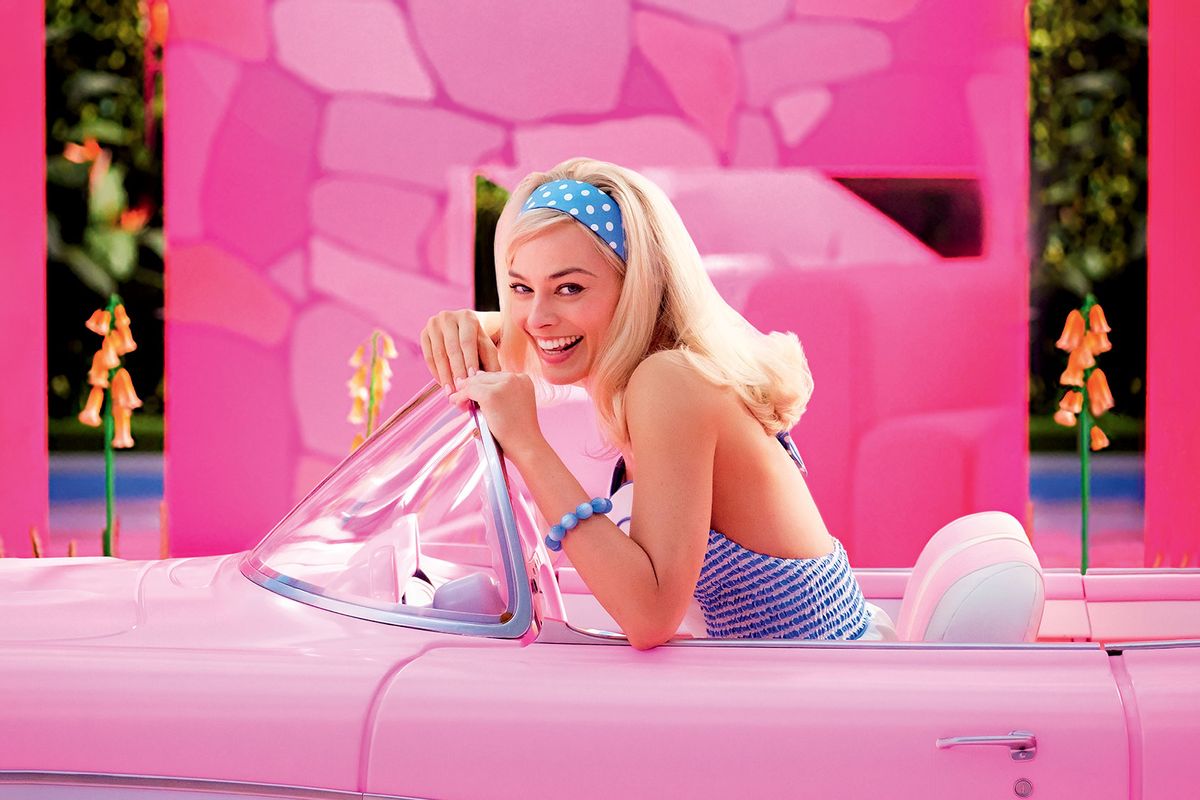According to the internet, the life of a hot girl goes something like this: Wake up and log on to a Lazy Girl Job, during lunch take a Hot Girl Walk, listen to Sad Girl Music (hello Phoebe Bridgers), come home and eat a Girl Dinner — don't forget to Go Piss Girl! — and then work on either your Tomato Girl, Coastal Cowgirl or Clean Girl moodboard.
This linguistic trend isn't a step back for feminism — it's a reclamation of girlhood.
If this all sounds like gibberish to you, then you're probably not chronically online or on TikTok (lucky you). In that case, let me translate. Over the past couple of years, trends like Lazy Girl Job and Tomato Girl have emerged that describe a mundane phenomenon that is, unlike the name suggests, not really specific to girls or women and is itself nothing new. (The meme, Go Piss Girl, is literally just about . . . needing to pee.) The Lazy Girl Job trend, begun by content creator Gabrielle Judge, speaks to a desire to have a remote job, with chill management, pays enough to live comfortably and sustains itself when you do the bare minimum. Basically, it's Quiet Quitting but reframed for "girls."
Tomato Girl refers to a micro-aesthetic, which Slate describes as "aspirational Italian leisure chic." Drinking Aperol spritzes, summering in any destination where tomatoes are part of the common diet and reading by the beach are all foundational to this aesthetic and lifestyle.
Perhaps the most popular trend among them right now is the Girl Dinner, which refers to when people are too tired to cook a proper meal and end up eating a bunch of snacks for dinner. The trend, which has over a billion views on TikTok, began when user Olivia Maher shared a video of her dinner composed of bread, cheese and grapes.
 Fresh Mediterranean platter on a table (Getty Images/Alvarez)There's not much that unites these disparate trends that have popped up over the years except for the fact that they're labeled for girls — even when they were started and predominantly practiced by 20-somethings and grown women. The omnipresence of these trends make it easy to see how the word "girls" has grown in its usage since the 2000s and is currently at its zenith, according to Google Ngram. It may seem weird, even infantilizing, for so many women to refer to themselves as such, but this linguistic trend isn't a step back for feminism — it's a reclamation of girlhood.
Fresh Mediterranean platter on a table (Getty Images/Alvarez)There's not much that unites these disparate trends that have popped up over the years except for the fact that they're labeled for girls — even when they were started and predominantly practiced by 20-somethings and grown women. The omnipresence of these trends make it easy to see how the word "girls" has grown in its usage since the 2000s and is currently at its zenith, according to Google Ngram. It may seem weird, even infantilizing, for so many women to refer to themselves as such, but this linguistic trend isn't a step back for feminism — it's a reclamation of girlhood.
Because what does it really mean to be a girl, anyway? When the word entered the English language in the 13th century, it was used to refer to children of any gender. In the 14th century, the word evolved to refer specifically to female children. Oxford Dictionary notes it even referred specifically to prostitutes around the 1600s. Two centuries later, it was used as a condescending way to refer to women of any age, which can still be true today. If a man were to call a 30-year-old woman a girl in a workplace setting, for instance, well . . . it wouldn't be good.
Now, the word is taken to mean "a young or relatively young woman." This, like all its past definitions, falls short for two reasons. First, its meaning is typically defined by what others call women or young women — not what they call one another. The dictionary's example quotes, like "my girl," uses the word from a man's perspective, almost as if the word exists for the sake of others to classify women.
We need your help to stay independent
Second, the definitions reveal the inherent misogyny found in language. As explained by Harvard Professor of Anthropology Susan Greenhalgh, "For college-aged 'males,' we have the helpful term 'guys,' which allows us to avoid both 'men' and 'boys.' For 'females,' there is no similar term (the comparable term, 'gals,' having gone out of fashion a long time ago), forcing us to choose between 'girls' and 'women.'" Hence, the conundrum we find ourselves in now. There is no word to describe a woman who is not quite a full adult but not a child. While men are afforded a name, and thus space, to figure things out and come of age, women are not. Women are stuck being "girls" (read: immature, innocent, inane) until they essentially get married.
What does it really mean to be a girl, anyway?
But that's where the recent trends come in. The growing usage of the word girl in our lexicon speaks to the desire to acknowledge that awkward transitory phase and to divorce the word from the male-centered and toxic ways girl culture is so often depicted. The early aughts is when the word girl began rising in usage, and it's here one can see how the term began to more specifically reference this 20-something stage in life. By the 2010s, TV shows like "Girls," "New Girl" and "2 Broke Girls" reflected our concept of the word as young women attempting to adjust to adulthood.
On screen and IRL, 20-something women referring to themselves as girls define a new period of girlhood. What was once commonly referred to as a time of adolescence is now a time for quasi-maturity. It's also fitting that a new word wasn't invented to speak about Girlhood 2.0, because they're alike in a lot of ways. At 13, a young girl is adjusting to a new body, how that body is now being perceived by others and coming to grips with how to navigate this new world. At 23, a girl enters a new world that is the workplace and tax forms and now has to figure out again who she wants to be at this age.
For many women, OG Girlhood was the dark ages. As Melissa Febos, author of the book of essays "Girlhood," notes, it is in this time that women endure the transformation from subject to object. It's here where they confront their bodies, or rather confront other people recognizing their bodies. When they are first forced to swallow their "no" in fear of the consequences. When they learn that they are desired and feel desire for sex but are shamed for acting on it. When they learn that consent is an empty aspiration. Girlhood is a time when, as one interview subject tells Febos, "patriarchy colonizes our brains like a virus."
OG Girlhood is a time of innocence lost which makes its second coming that much more empowering. To do it over again, at least in name, is to reclaim the transformation that was forced upon you. A variation of the meme, "I'll be a teenage girl until I'm 27" makes the rounds every so often online, and it makes sense. Under this new linguistic trajectory, a girl isn't just a child, she's a young adult somewhere along her journey of self-discovery. This time, on her own terms. No, it's not the plot of "Barbie," but its familiarity makes the movie's success make all the more sense. What better testament to our desire to use "girl" as a reference to a more mature coming-of-age is there than this year's blockbuster, which not only speaks to Girlhood 2.0 but is also directed by Greta Gerwig whose work often goes hand in hand with the subject?
Want a daily wrap-up of all the news and commentary Salon has to offer? Subscribe to our morning newsletter, Crash Course.
Turns out we're all a "Barbie Girl" in the end. When we participate in trends like Girl Dinner and Hot Girl Walk, we speak to this same desire to redo girlhood. Rather than coming of age under the direction and fear of the male gaze, the trends create a new context for the word girl that is concerned with the commonality between women, even if it's in the universal need to go for a walk (or, uh, pee). This year's onslaught of girl trends creates a language that operates between women and girls, reaching for a communal interiority divorced from straight male desire.
To name something is to have power over it. It acknowledges and affirms an identity. So when a 34-year-old woman refers to herself as a girl or eating a girl dinner, it negates the idea that girlhood is merely a time when we stare shamefully at the mirror. Instead, it asserts girlhood as a shared space between other young women who are free to be lazy and unkept. It seems to say, "Yes, girl. You do you."
Read more
about this topic



Shares